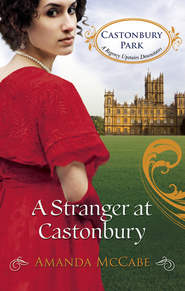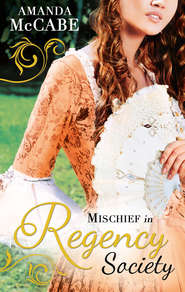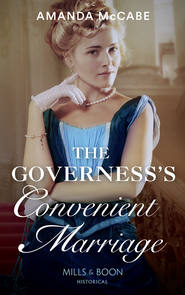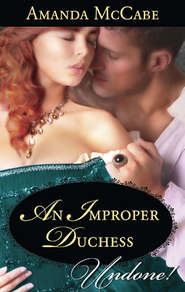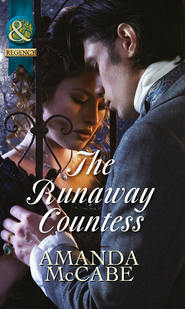По всем вопросам обращайтесь на: info@litportal.ru
(©) 2003-2024.
✖
NOTORIOUS in the Tudor Court: A Sinful Alliance / A Notorious Woman
Настройки чтения
Размер шрифта
Высота строк
Поля
“I am glad to hear it. A Court that does not dance or make merry music could be called…”
“Spanish, mayhap?”
They chuckled together at the naughty little dig. As Marguerite pressed her hand to her lips to hide her giggles, she noticed Father Pierre watching her, a frown on his pale, thin face.
She turned resolutely away from him, determined that his stares would not distract her today.
“I do hear that the Spanish care little for such worldly pursuits,” she murmured. “But is your own queen not Spanish? What does she think of dancing?”
Tilney shrugged. “Queen Katherine is usually of good cheer. She is most indulgent, and famous for her serene smile and even temper. She may no longer dance herself, but she is a gracious hostess.” “Usually?”
He opened his mouth to reply, then seemed to think better of it. Instead he smiled, and gestured to the bank of the river. “See there, mademoiselle. Your first glimpse of the palace of Greenwich.”
Marguerite leaned to the side, watching closely as the barge slowed on its approach. Greenwich was not pale and graceful, as François’s plans for Fontainebleau were. It obviously did not intend to convey a deceptive delicacy. It was long and low, and pretended to nothing but what it was—a strong palace, a home yet also the receptacle of power.
The pitched roof was as grey as the sky above, blending with the wispy smoke that curled from its many chimneys, but the walls were faced in red brick in the old Burgundian style.
There was no moat or fortifications; that would have been too old-fashioned even for the English. Instead, narrow windows, glinting like a thousand watchful eyes, stared out over the river.
“It is very pretty,” she said. “A fit setting for revels, I would say.”
“It is built around three courtyards,” Tilney said. “Perfect for games of bowls. And there are tennis courts and tiltyards.”
Marguerite laughed. “It does sound a merry place. Dancing, bowls, tennis…”
“Ah, mademoiselle, I fear you will think us nothing but frivolous! Look you there, the Church of the Observant Friars of St Francis. The queen is their patron, and they are always there to remind us of a higher purpose.”
“And to immediately take your confession when needed?”
“That, too.” Tilney was summoned to join the English courtiers as the barge docked, and Marguerite went to see if Claudine, the Comtesse de Calonne, required her assistance. The young comtesse was enceinte, and the voyage was not a comfortable one for her. She bore it all well enough, her face so pale that her golden freckles stood out in stark relief, but she spent most of her time with eyes tightly shut, listening to one of her ladies read poetry aloud while another massaged her temples with lavender oil. She did not often need—or want—Marguerite’s assistance.
The rumours of her handsome husband’s many infidelities could not help her temper, either. The comte and comtesse were cousins, married very young, but it was said Claudine cared more for her husband than he did for her.
“We have arrived, madame la Comtesse,” Marguerite said, kneeling beside Claudine to help her gather her gloves and smooth her cloak and headdress. “Soon you will be tucked up in your own feather bed, with a warm fire and a cup of spiced wine.”
Claudine smiled tightly. “Or more likely pressed into a cold room with ten other people and only ale to drink! These English—pah. They do not understand true hospitality.”
“Then we must teach them, madame!” Marguerite nodded to one of Claudine’s maids, and between them they helped her to her feet so she could join her husband in disembarking. “We will set a fine French example.”
“At least they sent a cardinal to greet us,” Claudine said, gesturing to the man in scarlet who awaited them, surrounded by so many attendants in black he seemed enmeshed in a flock of crows. “Not some mere clerk.”
“I am sure King Henry has a better sense of protocol than all that,” Marguerite replied, examining the man. It had to be Wolsey himself—the dangerous, all-powerful Wolsey—for he had the wide girth and long, bumpy nose of his portraits.
She had heard tell that the great Cardinal, Archbishop of York, the one man Henry relied on above all others, wore a hair shirt beneath his opulent scarlet velvets and satins. And Marguerite could well believe it, to judge by his pinched, grey face. He did not look like a well man. Still, she would not like to cross swords with him. It was fortunate he promoted the French treaty so assiduously.
Marguerite fell into step behind Claudine as they all left the barge and the play commenced at last.
Claudine’s fears proved to be unfounded, for she was given an apartment to herself, albeit a rather small one almost beneath the eaves of the palace. Marguerite had an even tinier room tucked behind, a closet with scarcely space for a bed and clothes chest, and one tiny window set high in the wall. But the insignificant space was perfect for her needs—private, quiet, and, as the page told her, near a hidden staircase that led to the jakes and then out to the gardens.
Ideal for secret errands.
Left to her own devices while Claudine rested before the evening’s festivities, Marguerite set about unpacking her travelling cases. All the velvet gowns and silk sleeves, the quilted satin petticoats and jewelled headdresses, were shaken, smoothed and tucked with lavender into the chest. The high-heeled brocade shoes and embroidered stockings, her small jewel case and fitted box of toilette items, were arrayed on top.
Once the case was emptied of its fine, feminine cargo, Marguerite lifted out the false bottom. There, carefully swathed in cotton batting, were her daggers and her sword.
The blades were made to her own specifications in the king’s own forge, smaller and lighter to fit her size and strength, perfectly balanced, delicate as a dancer, strong as marble.
Holding her sword outstretched, she took up a fighting stance and thrust once, twice at the air. The steel sang in the cold breeze, a quick, fatal whine, then perfect silence. It was truly a thing of beauty.
Smiling, she tucked it safely away, where it could rest until needed. She took up one of the daggers, a thin blade that appeared almost as dainty, and useless, as a lady’s eating knife. But it was designed to slip quickly, neatly, between a man’s ribs, leaving only a fatal drop of blood behind.
The hilt was set with tiny rubies, winking in the hazy light like serpent’s eyes. For a moment, she remembered her old blade, her favourite, with its rare emerald.
She remembered, too, how she had lost it. But one day she would get it back.
Marguerite lifted the hem of her skirt, tucking the blade into a sheath attached to her garter. She couldn’t think about him now. He had no place here. She had her errand laid out before her, and it would begin with tonight’s formal banquet to welcome their delegation. She needed to bathe and change her gown, to don her disguise of velvet and pearls.
Why, then, did it seem like the Russian followed her everywhere she went, and had for more than the last year? Those icy blue eyes…
Marguerite slammed the lid of her case and pushed it beneath the window, as if she could break his memory in two. The tiny pane of precious glass was so high she had to climb atop the case to see out. Her room looked down on one of the three courtyards Tilney had told her of, a carefully laid-out garden that slumbered in the winter chill. The square and diamond-shaped flowerbeds were brown and brittle, the trees bare, the fountains still. Yet she could clearly see that come summer it would be spectacular, a riot of roses, lilies, violets, gillyflowers, scented herbs, green vines twisting over the low railings and trellises.
The gardens were hardly dead now, for people strolled along the white gravel pathways, their Court raiment as bright as any flower could hope to be. Were they English, French, Spanish? She could not tell from her high perch. But she would know all soon enough.
Chapter Four
“And you see there, Master Ostrovsky, the king’s newly built banquet house. And, over there, at the other end of the tiltyard, the theatre,” Sir Henry Guildford, the king’s Master of the Revels, said, waving toward a long, low wooden building as they strolled through the gardens. Even at this late moment, as the sun set on the first day of this vital meeting, workmen scurried about, hammering, sawing, putting the last details in place on these new structures.
“That space shall be for the planned pageants and masquerades,” Guildford said, leading Nicolai toward the theatre. They ducked around a crowd of servants building two towering silk trees, a Tudor hawthorn and a Valois mulberry. “The king is also very fond of spontaneous disguisings, but one never knows when those will occur, no matter how organised my office strives to be.”
The tightening of Guildford’s mouth in his plump face was the only sign of the vexation such “spontaneous” displays engendered. The Master of the Revels was meant to oversee all the Court’s entertainments, even to keeping account of all the costumes and properties, the casting of various roles. That could not be easy when the one person most meant to be impressed by these careful displays kept subverting them!
Nicolai had a hard enough time herding his own small troupe on their travels. He did not envy Sir Henry his task of shepherding an entire Court. “It must be a fine thing to have your own space for this great task, Sir Henry,” Nicolai said, nodding toward the new theatre.
“‘Tis not only my space, Master Ostrovsky. We must share it with the Master of the King’s Minstrels and his musicians,” Guildford answered. “But there is room for us to store our properties, which is a blessing. Usually they must be fetched from a great distance.”
Nicolai’s props were often stored in a painted wagon, with more dangerous items hidden among the masks and bells. Items for more—discreet tasks. But he merely nodded understandingly.
“We are very glad to welcome you here, Master Ostrovsky,” Guildford went on. His smooth tone gave no hint of curiosity about what Nicolai, a player and a Russian to boot, might be doing among the Spanish party. “Assistance with our revels is always greatly to be desired, and Señor Mendoza tells us you have much experience with Italian pageants. All things Italian are very fashionable, you know.”
“It is true I am recently come from Venice,” Nicolai answered.
“Ah, yes, the Venetians. They do enjoy their masquerades and fêtes, do they not? Excellent, excellent! I have so very many tasks, and most of my idiotish assistants can do naught unless I watch them at every moment.”
“I am happy to assist in any way I can, Sir Henry.” In Nicolai’s experience, it was often the actors at Court—both the professionals from the Office of the Revels and the courtiers who so often took on roles—who knew most of the secrets. The hidden plans and desires. If he could do what he did best, insinuate himself into a play, his task would be that much easier.
“The king has ordered a different entertainment for almost every evening. I will be happy of your assistance in directing some of our players.” Sir Henry shook his head, muttering, “The ladies all want to take part, but they do not want to work, you see. Merely gossip and giggle together without learning their lines and postures.”
Nicolai laughed. “I am told I work well with the ladies, Sir Henry.”







